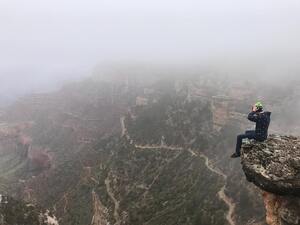
This is the second in a deep-dive series on the stories in Rick’s newest book, Random Precision. The following blog includes spoilers.
In 2003, I did a weeklong mission work project with a homeless program in Staten Island, N.Y. I wasn’t a stranger to the plight of the homeless; by then I’d been volunteering with a shelter in Kalamazoo for 13 years. But I wasn’t prepared for the story that one young Staten Islander told. Living on the streets, he’d sometimes get so hungry that he’d steal napkins and butter pats from sidewalk cafes and eat butter-frosted napkins as a meal.
Years later, that single anecdote became the inspiration for “The Chasm.”
Stories of swapping places are as old as “The Prince and the Pauper” and as recent as “Freaky Friday.” In this case I took a cue from a biblical parable: the rich man and Lazarus. In Luke 16, Jesus speaks of a well-off man who ignores the beggar Lazarus until the two die. Lazarus lands in Heaven, and the rich man wakes up in Hell, and they’re separated by “a great chasm” that keeps the rich man from gaining relief.
For me, the “chasm” in this story is one—or many—of our own making. Extreme income disparities keep the poor from succeeding. Systemic racism keeps Blacks, indigenous and people of color from sharing in the American dream. Prejudices—“they’re lazy, they’re scammers, they don’t deserve any help”—are chasms that marginalize entire populations.
“The Chasm” puts one of those prejudiced individuals into a homeless man’s shoes. He experiences the despair, the hopelessness, the bigotry—and yes, the eat-a-napkin hunger—that his counterpart lived with every day. But in this story, the rich man isn’t trapped in Hell. Lazare (see what I did there?), suddenly given every resource to succeed in life, sacrifices it all to find and restore his tormentor. But Derek Vayne learns a lesson that will stick with him forever.
Many people who read “The Chasm” find it shocking and sobering because it makes the homeless experience real, more than a nameless person with a cardboard sign at a street corner. My hope is, in making it real, we’ll be motivated to do more to help the homeless.
“The Chasm” won a community literary award in 2005. I had to update it a little for Random Precision, swapping Derek’s original clamshell cellphone for a smartphone. Virgil’s Real Barbecue is an actual restaurant near Times Square, one of my favorite NYC eateries (though sadly I haven’t been there in several years). The places Derek walks in his wanderings are all places I’ve trod.
In 2003, I did a weeklong mission work project with a homeless program in Staten Island, N.Y. I wasn’t a stranger to the plight of the homeless; by then I’d been volunteering with a shelter in Kalamazoo for 13 years. But I wasn’t prepared for the story that one young Staten Islander told. Living on the streets, he’d sometimes get so hungry that he’d steal napkins and butter pats from sidewalk cafes and eat butter-frosted napkins as a meal.
Years later, that single anecdote became the inspiration for “The Chasm.”
Stories of swapping places are as old as “The Prince and the Pauper” and as recent as “Freaky Friday.” In this case I took a cue from a biblical parable: the rich man and Lazarus. In Luke 16, Jesus speaks of a well-off man who ignores the beggar Lazarus until the two die. Lazarus lands in Heaven, and the rich man wakes up in Hell, and they’re separated by “a great chasm” that keeps the rich man from gaining relief.
For me, the “chasm” in this story is one—or many—of our own making. Extreme income disparities keep the poor from succeeding. Systemic racism keeps Blacks, indigenous and people of color from sharing in the American dream. Prejudices—“they’re lazy, they’re scammers, they don’t deserve any help”—are chasms that marginalize entire populations.
“The Chasm” puts one of those prejudiced individuals into a homeless man’s shoes. He experiences the despair, the hopelessness, the bigotry—and yes, the eat-a-napkin hunger—that his counterpart lived with every day. But in this story, the rich man isn’t trapped in Hell. Lazare (see what I did there?), suddenly given every resource to succeed in life, sacrifices it all to find and restore his tormentor. But Derek Vayne learns a lesson that will stick with him forever.
Many people who read “The Chasm” find it shocking and sobering because it makes the homeless experience real, more than a nameless person with a cardboard sign at a street corner. My hope is, in making it real, we’ll be motivated to do more to help the homeless.
“The Chasm” won a community literary award in 2005. I had to update it a little for Random Precision, swapping Derek’s original clamshell cellphone for a smartphone. Virgil’s Real Barbecue is an actual restaurant near Times Square, one of my favorite NYC eateries (though sadly I haven’t been there in several years). The places Derek walks in his wanderings are all places I’ve trod.
 RSS Feed
RSS Feed
